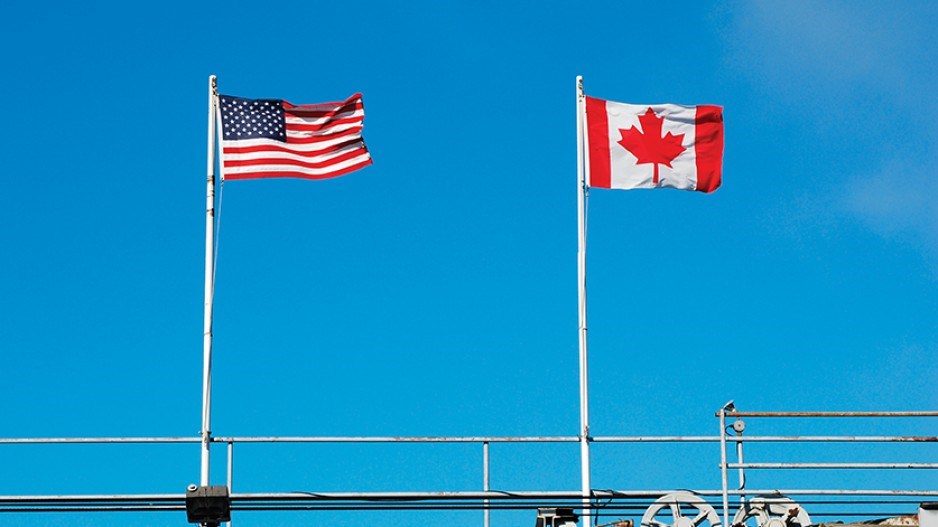A recent seminar downplayed the negative effect the new Donald Trump regime has had on Canadians doing business in the United States.
Presenters at the Pacific Customs Brokers Ltd. (PCBL) event included cross-border lawyers, accountants, customs brokers and logistics professionals with experience in Canada-U.S. relations. The majority agreed that, while public perception is that cross-border relations have become increasingly strained under the new president, changes have been minimal.
“Since election day, we have formed almost 40 new U.S. entities, and all 40 are owned by Canadian parent companies,” said Gene Moses, presenter and cross-border business lawyer. “On the business side, we haven’t skipped a beat.”
Greg Timm, PCBL’s chief operating officer, agreed that there has been little change in cross-border business.
“Despite the political rhetoric of tearing up [the North American Free Trade Agreement], companies on day-to-day business are still moving full speed ahead.”
Like retying a loose shoelace, said Timm, certain laces are being pulled snug around slacked spots.
“There are some thickening rules which require the input of an expert, whether that’s immigration, taxation, business corporate setups, distribution methods or customs experts,” said Timm.
“There is lots of discussion about food safety, lots of discussion about protection of the environment, lots of discussions of phytosanitary issues. Those regulations continually emerge; they always have.”
Timm also pointed to increased American interest in products’ origins.
“The U.S. and Canada are in a current dispute about third-party shipping when it comes to things like trademarks, patents and intellectual rights protection, so all goods coming in through Canada.
“Americans are becoming very sensitive to rules of origin, and Canada is probably a more open and freer trading nation just because of the makeup of our citizens, so [Canadians] have to be very diligent in ensuring what goes into our products is well documented.”
Meanwhile, many lawyers and entrepreneurs claim the impact of Trump’s stance on immigration has been exaggerated.
“Absolutely nothing has changed with Trump, and I sincerely doubt despite all the rhetoric that anything will,” said U.S. immigration lawyer Greg Boos.
“Most Canadian business people who enter the United States will make sales on behalf of Canadian companies. To do so, they don’t need to have formal visas or work permits. All they need to do is go to the border, say ‘I am Canadian, I am going down to sell something for my Canadian company, I am going to come back with the sales order, and we are going to process it and ship the goods out of Canada.’”
The issue, Boos said, begins once a Canadian company gets big enough that the American company asks the Canadian company to carry its products.
“When that happens, the Canadian is not eligible for entry under that option without a formal visa or work permit,” said Boos. “The minute you start carrying U.S. products, you are no longer involved in international trade and commerce.”
The main problem Boos sees year after year is the lack of Canadian companies’ preparation.
“Each company coming to the United States needs to develop a short-term plan, a medium-term plan and a long-term plan. A good plan doesn’t include just the immigration attorney. It includes a good tax adviser that is proficient in both Canada and U.S. taxation and, among other things, it includes a good business attorney if you are setting up a branch.”
An ongoing cross-border business concern is digital asset protection.
“We talk about general tips and tricks, and one of the things that has come up recently for Canadians crossing the border is digital privacy,” said Heather Fathali, immigration attorney at Cascadia Cross-Border Law. “This is again where advanced planning becomes very important. Non-citizens who are seeking entry to the U.S. can be asked to unlock their devices, provide their passwords and disclose their social media information.”
Digital security is nothing new, but people looking to do business in the U.S. can inadvertently expose sensitive tax information or client files by not protecting themselves.
“We advise people to take stock of what they are putting out about themselves into the digital universe. These are rules that have always been in place, but they are getting more and more attention,” said Fathali.
Boos added that a misrepresentation in the entry process “can lead to being banned from the U.S. forever.”
Simply put, Timm advises the “know before you go” principle.
“Canadians by nature are conservative people,” he said. “We aren’t the biggest risk-takers, so for the person that is starting up a company or has an idea to sell something, you have 350 million active buyers in the United States. There is huge opportunity, and we encourage British Columbians to take a risk.”




